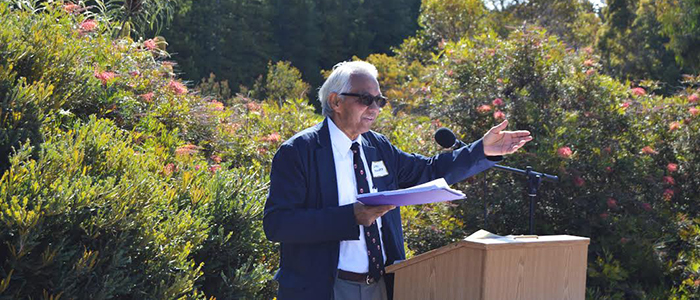His Life is His Message: A Tribute to Professor Triloki Pandey
Kianna Anvari, Class of 2015
The first time I sat in Professor Pandey’s classroom was on January 7, 2014. It was a Tuesday. I remember everything about that day — the bone-chilling breeze, the hollow faces on campus, and the empty feeling in my gut. I had just returned from a study abroad program; still in shock from a life-threatening trauma I endured there, only a few short weeks prior. Thoughts of withdrawing from the university bounced around my mind. But I chose to push onward through school. I chose to ignore my fears, even if that meant feeling cautious with every step I took.
I yanked my ear buds out as Professor Pandey raised his arm up, gesturing the start of his lecture. He dove right into the material for Cultures of India, speaking so fast that my pen could hardly keep up. In fact, I had to stop writing because my hand was near cramped. I raised my head from the back row and immediately spotted the enthusiasm in his eyes. He had nothing projected on the screen, only stacks of papers and books scattered around the table behind him. One by one he would hold a book up and write down a name on the chalkboard. Students scurried to write down every word, anxious about missing a beat.
But I wasn’t concerned with the small details; I was too busy watching the presentation before me. Never had I experienced such engagement in a lecture during my undergraduate career. Professor Pandey passionately explored the complexities of the Rig Veda, discussing the significance of its sacred text. He highlighted the different regions of India, introducing the numerous cultures that cover the nation. He provided us with a very detailed and complex image of the country, his country. Exactly one hour and forty-five minutes later, he wrapped up his lecture with the very same enthusiasm as the start. This lecture, and every lecture thereafter, flowed like a story with a beginning, middle, and end. Before we started packing up, his tone of voice changed. He cleared his throat and paced the front of the classroom with his worn-down piece of chalk still in hand.
I wish more than anything that I recorded his words that followed. Still, the impact of his message is something that I will never forget. Professor Pandey spoke with candor and emphasized that grades were not important to him — what really mattered was that we enjoyed what we were learning. Don’t stress about these little assignments and readings, he told us. What is important is that we take from the class what we put into it. He said: “The best education is self-education. Only you can teach yourself. I am only here to help guide the way.” To hear a university professor say such words was incredibly refreshing. I felt I could relax; not because I would not be penalized for skipping a reading, but because my happiness and self-care came first. These sincere words were exactly what I needed to hear in that moment — at a time when I felt completely outside of myself. I knew that staying at UCSC was the best choice to make. Professor Pandey’s authenticity was my therapy.
He then pointed his chalky finger around the classroom and told us that the divine is in each and every one of us. He urged us to embrace the divinity within ourselves and to find a balance in our senses — by neither over–indulging nor starving them. Our predicament, as he explained, is that we enter and leave this world empty. That can’t be escaped. What is in our control, however, is focusing on the journey of life rather than where we are going to end. Professor Pandey dropped his chalk and said thank you, and the classroom erupted in applause.
Without Professor Pandey’s words of assurance in class that night, and the nights that followed, I would not be in the stable place I am now. He helped show me that life plans are never cemented, but rather act as malleable objectives. His guidance allowed me to accept that one unjust night could propel me into an unwarranted maturation at age twenty, but that this was not necessarily a bad thing. He taught me to recognize the worries growing inside me, but to not let such fears trump my well-being. He demonstrated that in an institution where students are forced to absorb material on command, with very little validation for our strengths and efforts, there is a professor who believes in us. There is a professor who acknowledges that the value of our lives comes before the pressure of the system; if we are not happy then our education will not reach its full potential. Because of Professor Pandey’s comforting spirit I can now appreciate the fragility of life. I am no longer afraid; I am confident in the journey that is. Because, as Professor Pandey says, “Fear is the most de-stabilizing factor in life. Things will work out.”

